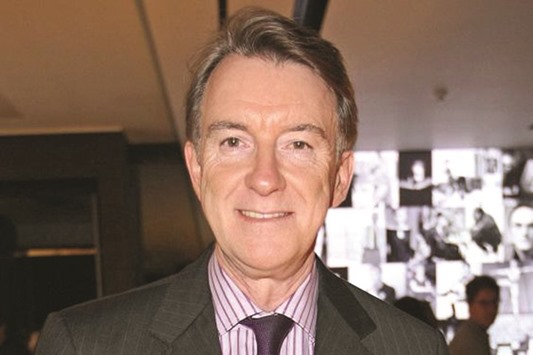Peter Mandelson, the former business secretary, has urged the government to go ahead with the controversial, Chinese-backed Hinkley Point nuclear project, saying that after Brexit “we can’t be too fussy about who we do trade with”.
Lord Mandelson, an architect of New Labour who served in several key positions under the Blair and Brown governments, said security fears over Chinese involvement in the project were unfounded, and Britain should foster a relationship with the country as a “prized trading partner”.
His intervention in the debate comes after China expressed apparent annoyance at a delay ordered by Theresa May, whose chief of staff last October wrote about how security experts were worried about giving the Chinese a role in Britain’s energy security.
Speaking on BBC Radio 4’s Today programme, Mandelson, whose many lucrative post-politics jobs include the presidency of the Great Britain China Centre, a pro-China lobby group, said he was not surprised that security agencies had made such conclusions, since “that’s their job”.
But he added: “The government has to consider China’s motivation for wanting to finance projects like this and, in my view and I guess in their view too, they judge that it would be commercial global suicide for China if they were to invest on the one hand and then try to mess around with other countries security on the next.
“I mean, nobody would trust China ever again; nobody would want to do business with Chinese investors ever again. The truth is that China would have far, far too much to lose if it were to start compromising other countries’ national security.”
Moreover, Britain’s vote to leave the European Union had put the country in a difficult position regarding trade, where we needed China more than it needed us, Mandelson said in comments that suggested that Britain could not afford to alienate Asia’s rising power.
He said: “We are in a slightly invidious position in trade vis-a-vis China, despite the size of our market we are probably less relevant to China out of the European Union because we would be unable to influence that huge bloc’s future trade policies anymore and out of the EU we are probably more dependent on China’s goodwill because we will need to replace trade lost in Europe.
“So we are not in the happiest of positions, but this is the reality and we have got to adopt a pragmatic approach to this. We can’t be too fussy about who we do trade with, whilst at the same time trying not to be a pushover and become supplicants in world trade.”
Mandelson’s comments came after China’s ambassador warned on Monday that relations with the UK could be jeopardised if the government chose to cancel Chinese investment in the £18bn Hinkley Point C reactor in Somerset.
Liu Xiaoming wrote in an article for the Financial Times: “Right now, the China-UK relationship is at a crucial historical juncture. Mutual trust should be treasured even more.
I hope the UK will keep its door open to China and that the British government will continue to support Hinkley Point — and come to a decision as soon as possible so that the project can proceed smoothly.”
A government spokesman later said the delays did not signal a cooling of enthusiasm for trade with China.
Treasury sources added that Philip Hammond, who travelled to China last month for the G20 finance ministers’ meeting in his first overseas visit as chancellor, was no less committed to securing Chinese investment into Britain than his predecessor, George Osborne, who had promised to inaugurate a “golden decade” of cooperation between the two countries.
EDF, the French state energy company which is due to build Hinkley point C, brought China General Nuclear Power Corp on board help spread the financial load by taking a 33% stake in the project.
China is also expected to have a significant role in reactors at Sizewell in Suffolk and Bradwell in Essex. The project is heavily subsidised by the taxpayer, and the government has promised to pay well over current market rates for electricity from the reactor.

Lord Mandelson
